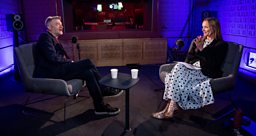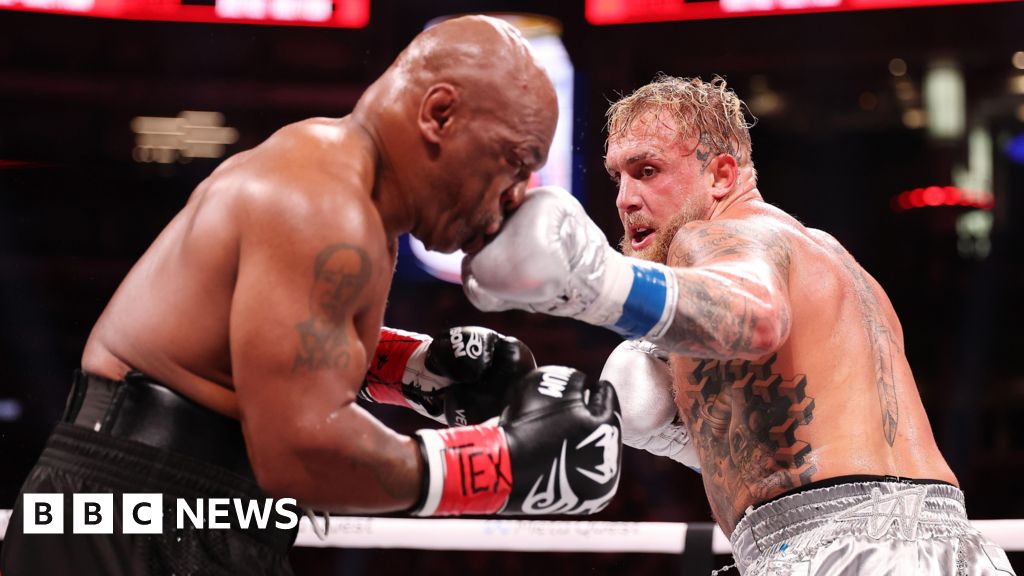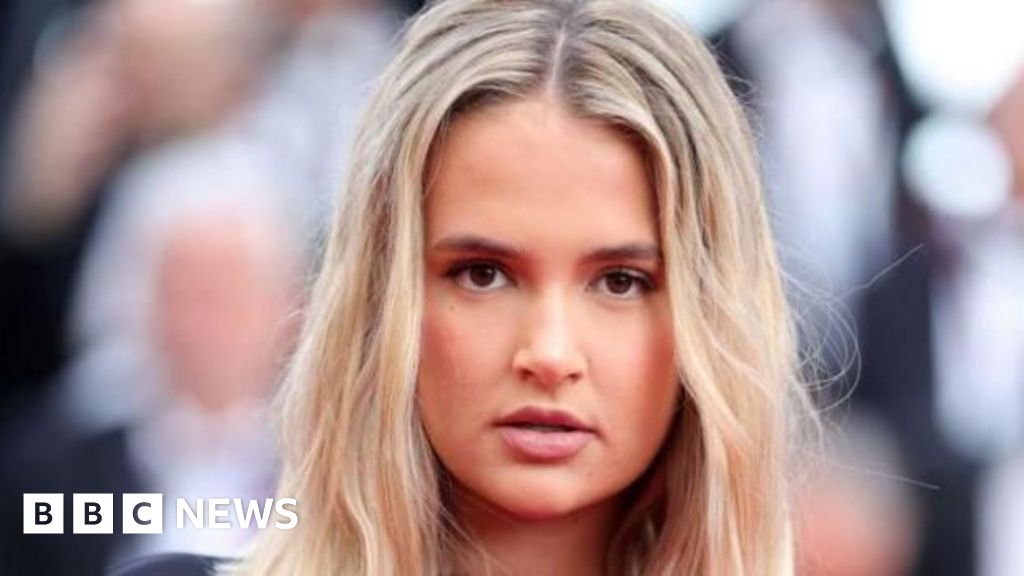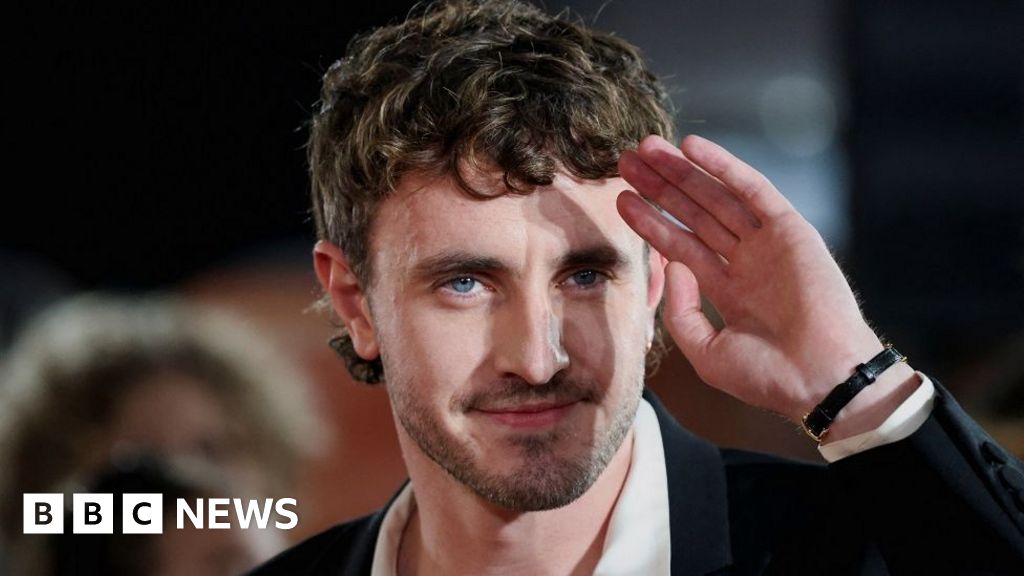ARTICLE AD BOX

Charlie Brooker with The Media Show's Katie Razzall
Charlie doesn't believe that technology will replace scriptwriters
“I toyed around with ChatGPT and you type in: ‘Come up with a Black Mirror storyline’ or: ‘Say something in the style of Philomena Cunk’, and it will do it and it will spit out something, that at first glance, you get a sudden spike of dread and think, ‘That's it, I'm out of a job! This thing has replaced me!’ because it looks convincing.”
Digging deeper Charlie says: “It's just sort of emulating. It's an impersonator, so that’s it for now it… It's mashing up stuff that other people have already done, it's just hoovering up content and repackaging it. And once you sit there and look at it, it's very derivative and you still need a human to come in and make it usable.”
“They're very powerful tools and it's a bit like we've grown an extra limb overnight that we don't quite know how to use it. It's amazing - great to have an extra limb - brilliant, but we keep clumsily knocking things over.”
He can't actually predict the news
“I was writing an episode of Black Mirror and my phone suddenly started going crazy and, and everyone was going, ‘Have you seen this? How did you know?’”
Charlie is referring to the claim made in 2015 in an unauthorised biography that the former Prime Minister David Cameron had simulated a sex act while at university with the head of a dead pig as part of an initiation ceremony. He has always denied the story and no proof has ever emerged. The story spookily echoes the plot of a 2011 episode of Black Mirror where the prime minister played by Rory Kinnear is forced to have sex on live television with a pig to secure the release of a kidnapped member of the British royal family.
“And I thought, ‘Well, if I had I, I wouldn't have written an episode about that, I'd have run into traffic screaming like the guy at the end of Invasion of the Body Snatchers, screaming, ‘Did you hear this?’”
“There's been quite a few storylines in Black Mirror that have sailed close to reality, it seems after the fact but often really, what I'm doing there is just looking at what's going on now, and extrapolating.”
How did Black Mirror start?
“So way back yonder in 2011 I'd written a show called Dead Set, which was a satirical zombie apocalypse story where there's a season of Big Brother going out and a zombie apocalypse happens, and the last people on earth to discover this are the housemates who are within the Big Brother compound.”
“It did well. It was an absurd premise played straight… As I was growing up, I was heavily influenced by [and] I really liked things like Tales of the Unexpected that the BBC used to put on. Play for Today used to be a thing and there would be weird one-off plays that were about ideas and quite kooky. And the Twilight Zone as well. I’d stay up late and watch the Twilight Zone.”
“I wanted to do a show that was… different sort of twist in the tail stories that had a lot of variety [and] that spanned different genres. That was really the starting point.”
“It became, I think in people's heads a thing that was about technology but that wasn't really where it started. It started in weird.”
Where did the name Black Mirror come from?
“It was literally when you switch a phone or an iPad or a TV off, it looks like a black mirror when you're looking at it. Also, to be honest, I just thought that sounds like a cool, slightly spooky name for an anthology show.”

Does he worry about going too far in Black Mirror?
“I don't think so. I don't think there's a problem if you're approaching things thoughtfully, what worries me… is disinformation, that really worries me, or, the potential. There was a thing a couple of months ago – an image of the pope in a puffer jacket that was quite funny that went viral and it was generated by generative AI. And that is, that's amusing, but also utterly terrifying when you can see where that's going to go.”
“Truthful looking lies that's, a worry, isn't it? There were images of Donald Trump being arrested weren't there, that were fake. It's ironic that that is fake news. That I find terrifying, the thought of that going unchecked.”
He didn't graduate from college
Charlie started a BA in Media Studies at the Polytechnic of Central London (now the University of Westminster) but he never completed it.
“I wrote a dissertation on video games and they… dismissed it out of hand because they said it did’t count. Now that would be fine,” says Charlie highlighting the change in attitude to one of the UK’s hugely successful industries.
“It was nearly 25,000 words on Sonic the Hedgehog, effectively, so I could understand, to be fair, why they… and I hadn't checked with anyone whether that was okay.”
“So I didn't get my degree because they said that didn't count. And I then I had seven years to write a follow up dissertation and I didn't bother.”
Charlie previously worked as a TV critic for The Guardian – what does he make of the Phillip Schofield story?
“It's a very difficult situation to comment on that I don't really know,” says a diplomatic Charlie. “I tried not to watch too much of the coverage – I actually haven't even had a TV aerial in my house for two years now.”
“That's not through some sort of Luddite style I-refuse-to-watch-the-mainstream-media type of thing. It was literally, we had our loft done and, and somebody cut through the cord and I haven't bothered to put it back on.”
Charlie describes himself as a 'news avoider'
“I did end of year shows quite often,” says Charlie talking about the Screenwipe TV series spinoffs that he presented up until 2016. “I think this is one of the reasons why I don't watch much of the news anymore… I would have to summarise the year, which involved watching a lot of footage, obviously. And that would ruin my Christmas every year… it would really depress me, sometimes it would genuinely get me down.”
“I remember when I was growing up, another thing I used to like watching was things like Spitting Image, or Not the Nine O'clock News which would satirize what was going on in the world at the time.”
“And it would be comforting in a way that there were other people looking at the Cold War and saying, this is scary, but let's, let's [find the comedy in it].”
“Then you realise, ‘But I'm just as scared and confused as anyone else’. That's a sort of horrible destabilising feeling.”
Why did Black Mirror move to Netflix?
The first two series of Black Mirror were made for Channel 4 before it moved to Netflix. So what brought about the switch?
“The boring reality is that what happened was they [Channel 4] were sort of like, ‘This show is expensive.’”
From this the idea of doing it is a co-production with an American production company came up. At the same time Black Mirror had developed a cult following over there which led to greater interest amongst the US networks.
“And so when we actually found a sort of partner in Netflix, they were saying to us, ‘Well, you can do two seasons’ and this, that and the other. And Channel 4 wanted to go through all the outlines and everything in advance before they'd green light the episodes. We’d previously had a situation where I'd sent some ideas for a potential third series and they'd rejected them all.”
Subsequent series have been made for Netflix rather than the UK broadcaster.
“I would've preferred it if Channel 4 had been more in the mix,” says Charlie. “I want to write and create things, and so if I'm being offered a lot of freedom to do that, then I'm, you're going to take it.”
How does he see the future of public service broadcasting in the UK?
“I love the BBC for instance, and I owe a lot to the BBC. I hope the license fee stays but it's easy for me to say that.”
“It's a cliche to say it, but in times when there's a big national story, everyone does turn to the BBC and it's got an important role in trying to bring the truth to, to people in a way that's impartial or as impartial as in, in a way that's going to annoy everyone,” laughs Charlie.
“But how do you finance it? I don't know, there's a question above my head.”
You can listen to Charlie Brooker's interview in full here.


 1 year ago
124
1 year ago
124








 English (US)
English (US)